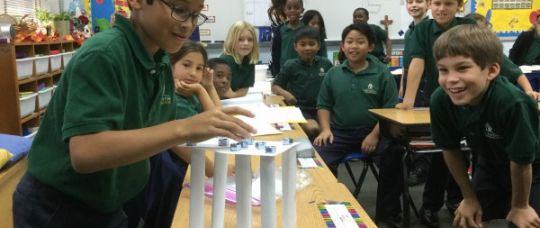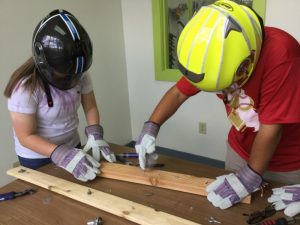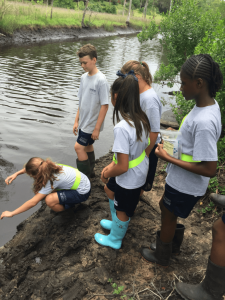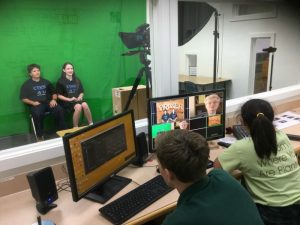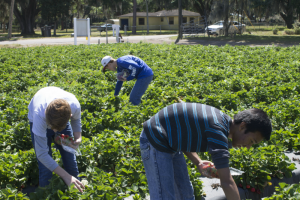The following article is a re-post of Christ the King Catholic School: First Florida school to earn STREAM Accreditation by Victoria R. LaFave. All Photos Courtesy of Christ the King Catholic School.
Not only has Christ the King Catholic School (CTK) in Jacksonville, Florida, received the distinction of being a 2010 National Blue Ribbon School of Excellence, but the school also has another honor: It is the first school in Florida to have received the prestigious STREAM Accreditation.
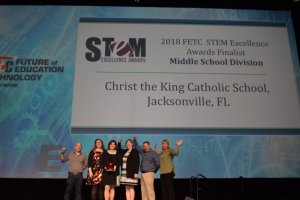 The STREAM accreditation was awarded during the 2016–2017 school year by the Florida Catholic Conference, the governing body of Catholic schools in Florida and parts of Georgia.
The STREAM accreditation was awarded during the 2016–2017 school year by the Florida Catholic Conference, the governing body of Catholic schools in Florida and parts of Georgia.
STREAM stands for Science, Technology, Religion, Engineering, Arts, and Math. Faculty at CTK offer unique, hands-on teaching and provide students with a dynamic learning environment through in-depth study and problem solving for a Universal Mission Project.
“As a Catholic school, we ensure that our educational goals support our Christian duties. We have dedicated our resources to the pursuit of 21st-century skills with moral values that are incorporated into everyday lessons,” explained Sue Pietrusza, MEd, assistant principal and technology integration specialist at CTK.
Pietrusza described the school’s new mission:
Our ultimate goal is for Christ the King Catholic School to be a role model and leader for other Catholic schools to show how STREAM can work in their schools and help them achieve these awards. Our students like coming to school and are excited about learning. We see the difference in our students through the hands-on learning we provide, so we’d love to pass that along to other Catholic schools as well. Schools from around the state are coming to our school to observe our students and teachers so they can get firsthand knowledge of how we are incorporating the STREAM activities throughout our school.
Specific STREAM Projects
Science: In addition to the regular grade-level science curriculum, a dedicated STEM teacher leads all grades (K-8) in weekly STEM projects in agriculture, ecology, and engineering. The school also has several gardens that the students maintain, along with a unique outdoor classroom and a creek on the property.
Technology: The school’s state-of-the-art Media Center boasts a video production studio, with all classes performing projects in digital media. For instance, students take part in airing their own morning and afternoon news shows. In classrooms with televisions, students can watch the live broadcasts. Third-grade students create and broadcast their own weather reports in the school, with the middle-school students running the production studio. The school even has its own call letters: CTK4U.
Religion: Middle-school students spend several months researching and problem solving for a Universal Mission Project (described below). This past year’s mission project, which encompassed all components of STREAM education, focused especially on the Religion aspect in that students were taught to help the less fortunate to improve their lives.
Engineering: In CTK’s new, one-of-a-kind engineering lab, all students experience hands-on learning in mechanical, chemical, electrical, agricultural, and structural engineering. Both elementary- and middle-school students use curriculum developed by the Boston Museum of Science. This curriculum focuses on teaching students how to fix problems. “We have our own work space where students can build models of the projects they are working on,” Pietrusza explained.
Arts: The Arts provide an avenue for student creativity in solving problems. Whether designing musical instruments, contributing to a school-wide visual representation of the water cycle, or promoting social justice through paintings, students enhance their understanding of STREAM through their participation in Fine Arts.
Math: The middle-school math teacher is a dedicated math specialist who leads small, level-appropriate classes and oversees math competitions.
2016–17 Universal Mission Project
Encompassing the students’ STREAM knowledge, CTK students worked together on a Universal Mission Project during the 2016–2017 school year. Students studied the lives of migrant farm workers in Plant City, Florida, under the guidance of St. Clement Catholic Church’s migrant ministry. For the project, students visited a strawberry farm, met with migrant farm workers, helped harvest the crops, and developed solutions for the problems faced by the workers. Students observed and researched the migrant workers’ daily struggles, including how much weight they lift every day, how much heat they are exposed to, and how much water they drink. They used their observations and research to provide solutions using the subjects of social studies, engineering, economics, and math to improve the workers’ quality of life and make their work easier. For instance, some student groups applied their knowledge of angles to work on a pulley system to make the workers’ processes more efficient.
This was a good reality check for the students,” Pietrusza explained. “In this hands-on mission project, the middle-school students learned to recognize the problems faced by migrant workers, studied how to make life better for them, came up with solutions, and then took it a step further and did not stop at stating the solutions; they executed the solutions, as well.
For example, one big issue faced by migrant workers is the fact that the children are with their parents in the fields, and therefore not going to school. Seeing this, one of the student groups proposed a “traveling teacher,” who traveled on a school bus directly to the families in the fields and provided the children of workers with the opportunity to attend school instead of work at a young age.
Students also spoke from the pulpit at Mass on Sunday and asked parishioners for donations to help the migrant workers,” Pietrusza continued. “In doing so, students incorporated Catholic social teaching into their entire mission project and ultimately received donations of food, blankets, diapers, gift cards, and cash.
Something wonderful also happened in this process: not only did the students learn to appreciate the difficult work involved in harvesting the food they eat every day, they also expressed empathy and support for the workers’ situations.
The beauty of this project is that it changed people’s lives for the better: “The students came up with these practical solutions, which is really great,” Pietrusza observed.
This year’s CTK Universal Mission Project
This year the school’s Universal Mission Project has students thinking outside of their community — way outside of it — and into outer space. Students are working on how they would go about colonizing Mars. Some students are working on hydroponic systems that would allow them to grow their own food on Mars, while others are working on specific clothing that would be worn if they lived on Mars. Students even traveled to the Kennedy Space Center, giving them hands-on knowledge about the Red Planet, its characteristics, and the space program in general.
When discussing the Mars project, CTK Principal Stephanie Engelhardt said, “For the Universal Mission projects, students collaborate in teams, design and build models, and present their idea to the community. This interdisciplinary project requires real-world skill sets.”
This year, CTK placed in the top 40 for the NSTA (National Science Teachers Association) Shell Science Lab Challenge Competition for engineering lab supplies. In addition, CTK is a STEM Excellence Award Finalist — from the FETC (Future of Education Technology Conference).
